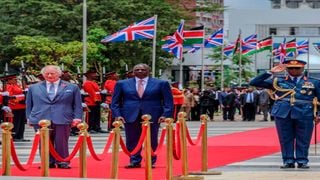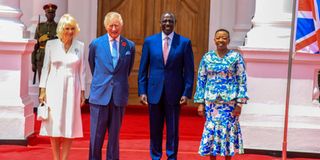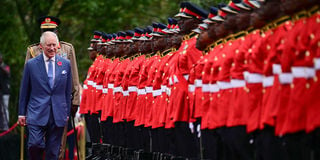
Britain's King Charles III (left) with Kenyan President William Ruto during the ceremonial welcome at the Uhuru Gardens in Nairobi on October 31, 2023.
| PCSNews
Premium
The sins that bind us: Of push for reparations from colonialism, slavery
It was no doubt a highly successful four-day State visit by King Charles III and Queen Camilla. It placed Kenya on the global spotlight and helped showcase many positives of a country that is all too often in the news for the wrong things.
The packed programme went like clockwork, save for a few mishaps that, however, did not detract from the glamour and importance of the royal visit.
On the second day of his visit last Wednesday at the Kariokor War Cemetery where he honoured soldiers who served the Empire in World War II, the King tripped on a piece of turf, but managed to keep his balance.
And the previous day at the Uhuru Gardens, a Kenya Defence Forces officer rushing past the royal couple slipped and tumbled to the ground almost barging into King, but he remained unruffled.
However, there are still many who feel that the British Monarch did not go far addressing lingering questions around the colonial past.
The Kenya Human Rights Commission and various other groups had in advance of the visit come out with lengthy statements demanding that the King issue an unequivocal apology for atrocities suffered by Kenyans during the struggle for independence.
At the State Banquet hosted by President William Ruto at the start of the visit, King Charles expressed “greatest sorrow and deepest regret” for the British misdeeds during that period, but stopped short of making the full apology being demanded.
He also did not comment on the call for Britain to pay reparations for those who were mistreated or killed in colonial detention camps. His statement actually just repeated the British government position first voiced in 2013 by then Foreign Secretary William Hague in an address to Parliament, and repeated by then High Commissioner to Kenya Christian Turner at a meeting with Mau Mau freedom wat veterans.

Britain's King Charles III walks wearing St Edward's Crown during the Coronation Ceremony inside Westminster Abbey in central London on May 6, 2023.
The 2013 statement, the first ever acknowledgement by the British government that it had committed crimes against Kenyans, simply expressed regret for what happened, but stopped short of an apology or admission of guilt.
Hague specifically clarified that the statement did not amount to an admission of liability. And that will remain a sticking point as the KHRC wants an apology and admission of liability, from which can follow discussion on financial compensation for affected families as well as broader reparations for the impact of colonial rule.
The human rights lobby was at the forefront of the legal suit by Mau Mau veterans in British courts that ultimately forced a 2012 out-of-court settlement by which Britain paid out compensation of around Sh330,000 to each of some 5,200 plaintiffs, and also undertook to fund a freedom war memorial.

President William Ruto, Britain's King Charles III, First lady Rachel Ruto and Queen Camilla at State House on October 31.
The KHRC was involved in the negotiations and supported the settlement, so it might seem a contradiction that they are now making new demands.
However, the founding chairman of the Commission who later served as Executive Director, former Chief Justice Willy Mutunga, does not see it as a contradiction.
According to him, fresh demands for an apology and compensation go beyond the Mau Mau case, as they are part of a global movement for reparations from colonialism and slavery being pushed by rights groups across Africa, North America, South America, the Caribbean, Europe and Asia.
Foreign policy issue
On the King’s visit in general, Dr Mutunga was not too impressed. “The British never left Kenya and they are free to visit us,” he told the Nation, “but if consulted I’d say he’s not welcome, or give conditions for his visit”.

Britain's King Charles III (L) inspects the Guard of Honour during the ceremonial welcome at the State House in Nairobi on October 31, 2023.
Those conditions would be that the King address the demands for an apology and reparations, victims of munitions left by British soldiers training in Laikipia, as well as lingering matters around land injustice and other unresolved issues from colonialism.
He also insists that the royal visit is a foreign policy issue, which demands public participation as mandated by the Constitution. His basic point is that citizens are impacted by decisions government makes on their behalf, and thus must have a say.
He references two articles he recently published in The Star newspaper taking issue with Kenya’s decision to send a police contingent to tackle armed gangs in Haiti, and President Ruto’s statement in support of Israel’s war against Hamas militants in the Gaza Strip.
“Ruto cannot say he supports Israeli genocide in Gaza in the name of 50 million people who have not been consulted”, Mutunga, insists, pointing out that there can be consequences.
He refers to the Norfolk Hotel bombing in the early 1980’s which was believed to be retaliation for Kenya’s cooperation with Israel during the raid to free hostages held by Palestinian militants at the Entebbe airport in Uganda. “If we are to be killed, let is know why we being killed,” he says.
He also offers that that King Charles does not speak for all the British people, noting demonstrations in the country against the governments support for Israeli bombings in Gaza.
“It’s a serious issue when the President speaks in our collective name but yet we are not consulted. It’s important for our democracy that we speak with one voice on issues, and that president and parliament are not captured by global interests that support Israel,” he says, equating the visit of King Charles to other issues of foreign engagement such as secret agreements on Chinese loans for the Standard Gauge Railway, trade pacts with the US and Britain, or getting entangled in American and Chinese rivalries.





